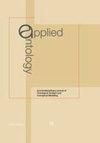语言本体论,应用于人口统计数据
IF 2.5
4区 计算机科学
Q3 COMPUTER SCIENCE, ARTIFICIAL INTELLIGENCE
引用次数: 0
摘要
在这里,我们提出了我们认为是关于什么是语言的一种新颖的描述,以及基于这种描述的语言和语言相关数据的公理丰富的表示。我们提出了一种语言的解释,即分布在人群中的倾向的集合,在这样做的过程中,我们解决了语言能力和实现它们的过程。这为表示其他类型的语言相关实体铺平了道路。像其他种类的人口统计数据一样,语言数据可能对许多领域的研究人员有用,包括生物医学研究。关于临床接触中使用的语言的数据通常包括在医疗记录中,并捕获了患者与提供者互动中的一个重要因素。与许多类型的患者和人口统计数据一样,关于个人首选语言和主要语言的数据由不同的系统以不同的方式组织。这可能成为数据集成的障碍。我们相信,一个强大的框架,用于表示一般语言,特别是首选语言和主要语言-迄今为止在本体中一直缺乏-可以促进来自不同数据源的语言相关数据的更成功集成。本文章由计算机程序翻译,如有差异,请以英文原文为准。
Ontology of language, with applications to demographic data
Here we present what we believe is a novel account of what languages are, along with an axiomatically rich representation of languages and language-related data that is based on this account. We propose an account of languages as aggregates of dispositions distributed across aggregates of persons, and in doing so we address linguistic competences and the processes that realize them. This paves the way for representing additional types of language-related entities. Like demographic data of other sorts, data about languages may be of use to researchers in a number of areas, including biomedical research. Data on the languages used in clinical encounters are typically included in medical records, and capture an important factor in patient-provider interactions. Like many types of patient and demographic data, data on a person’s preferred and primary languages are organized in different ways by different systems. This can be a barrier to data integration. We believe that a robust framework for representing language in general and preferred and primary language in particular – which has been lacking in ontologies thus far – can promote more successful integration of language-related data from disparate data sources.
求助全文
通过发布文献求助,成功后即可免费获取论文全文。
去求助
来源期刊

Applied Ontology
COMPUTER SCIENCE, ARTIFICIAL INTELLIGENCE-COMPUTER SCIENCE, INFORMATION SYSTEMS
CiteScore
4.80
自引率
30.00%
发文量
15
审稿时长
>12 weeks
期刊介绍:
Applied Ontology focuses on information content in its broadest sense. As the subtitle makes clear, two broad kinds of content-based research activities are envisioned: ontological analysis and conceptual modeling. The former includes any attempt to investigate the nature and structure of a domain of interest using rigorous philosophical or logical tools; the latter concerns the cognitive and linguistic structures we use to model the world, as well as the various analysis tools and methodologies we adopt for producing useful computational models, such as information systems schemes or knowledge structures. Applied Ontology is the first journal with explicit and exclusive focus on ontological analysis and conceptual modeling under an interdisciplinary view. It aims to establish a unique niche in the realm of scientific journals by carefully avoiding unnecessary duplication with discipline-oriented journals. For this reason, authors will be encouraged to use language that will be intelligible also to those outside their specific sector of expertise, and the review process will be tailored to this end. For example, authors of theoretical contributions will be encouraged to show the relevance of their theory for applications, while authors of more technological papers will be encouraged to show the relevance of a well-founded theoretical perspective. Moreover, the journal will publish papers focusing on representation languages or algorithms only where these address relevant content issues, whether at the level of practical application or of theoretical understanding. Similarly, it will publish descriptions of tools or implemented systems only where a contribution to the practice of ontological analysis and conceptual modeling is clearly established.
 求助内容:
求助内容: 应助结果提醒方式:
应助结果提醒方式:


